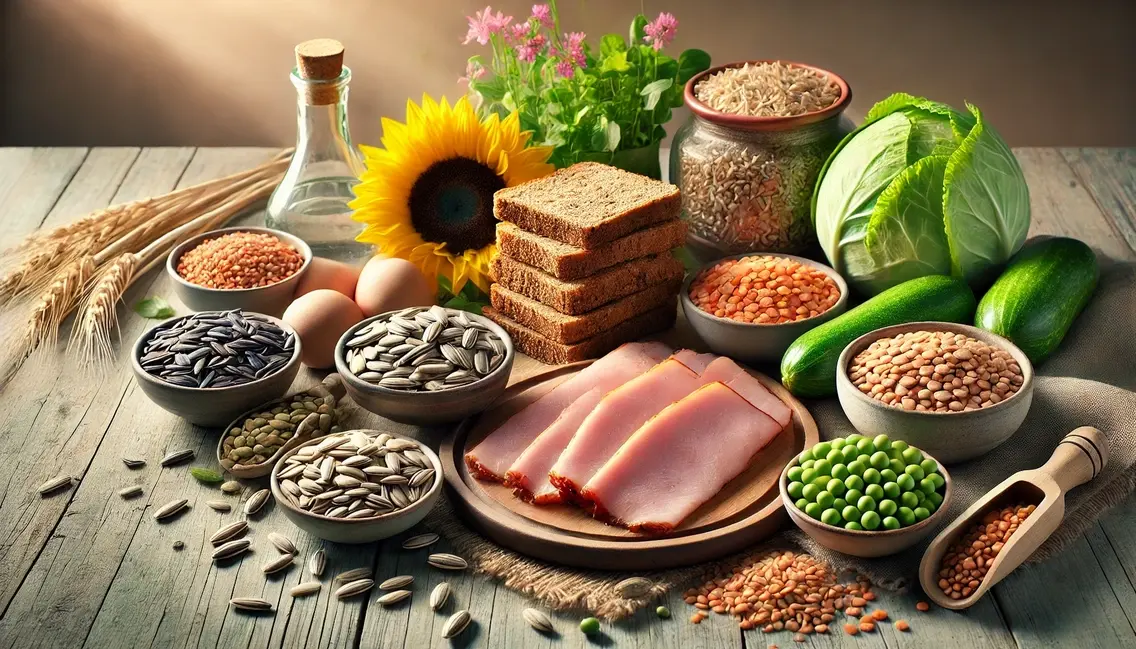Unlocking Energy and Vitality: The Secret Truth About Vitamin B1
Imagine if boosting your energy levels and maintaining optimal nerve function was as simple as optimizing your vitamin intake. Enter Vitamin B1, also known as thiamine, a powerhouse nutrient essential for converting carbohydrates into energy and supporting your nervous system. But here's the kicker: many people unknowingly risk deficiency due to lifestyle factors such as alcohol use or certain health conditions. What happens then? The consequences could be as serious as beriberi and cognitive impairments—a reality backed by leading health organizations like the WHO.
What you eat plays a significant role too; thiamine-rich foods such as whole grains, legumes, and pork can prevent these dire outcomes. But for those who can’t meet their daily needs through diet alone, supplements can be a game-changer in enhancing energy metabolism and maintaining cognitive health. So, how much Thiamine should you incorporate into your routine, and who should exercise caution? GymBro.ca is here to unveil everything you need to know about making thiamine your ally. Let's delve into the science-backed benefits and discover why this overlooked vitamin might be the missing link in your health regimen.
Health Benefits of Vitamin B1 (Thiamine)
Vitamin B1, or thiamine, is a crucial nutrient that supports various physiological functions in the body. It is central to energy conversion, metabolic processes, and maintaining a healthy nervous system, making it essential for overall well-being.
Key Health Benefits
- Promotes Energy Metabolism
Thiamine's primary role is to aid in the conversion of carbohydrates into energy, which is essential for sustaining energy levels and ensuring efficient bodily functions. This is supported by research from the National Institutes of Health (NIH), highlighting its vital importance.
- Supports Nervous System Function
Thiamine is integral to nerve function and muscle contraction, aiding in the synthesis of neurotransmitters necessary for nerve impulse transmission. This support for neurological health underpins effective communication within the nervous system.
- Aids in Cognitive Health
Ensuring adequate thiamine intake contributes to brain function and cognitive health. Studies have shown that it plays a role in improving mental performance and may help reduce the risk of cognitive decline and memory disorders.
- Prevents Deficiency-Related Disorders
Maintaining sufficient thiamine levels helps prevent conditions such as beriberi and Wernicke-Korsakoff syndrome, which can lead to cardiovascular and neurological issues. According to the World Health Organization (WHO), thiamine deficiency symptoms include fatigue and irritability.
Optimizing Your Thiamine Intake
Thiamine is fundamental to maintaining health and vitality. To harness its benefits fully, consider dietary sources and supplements. For those seeking to enhance their energy metabolism and overall health, boost your energy metabolism with Jamieson's Vitamin B1 100 mg tablets. These can be a convenient addition to your routine, supporting your body’s need for this essential nutrient.
Dietary Sources of Vitamin B1 (Thiamine)
Vitamin B1, also known as thiamine, plays a vital role in energy metabolism and the proper functioning of the nervous system. It is crucial for converting carbohydrates into energy, and a deficiency can lead to significant health issues. While there are natural food sources rich in thiamine, meeting daily requirements through diet alone can be challenging for many.
Natural Sources of Vitamin B1 (Thiamine)
- Whole Grains
Whole grains such as wheat, oats, and brown rice are rich in thiamine. It's the outer layers of these grains that contain the highest concentrations, making whole grains superior to refined grains for Vitamin B1 intake.
- Pork
Pork offers one of the richest animal sources of thiamine. It's an excellent protein source that supports both muscle health and energy metabolism.
- Legumes
Lentils, black beans, and peas are packed with fiber, protein, and thiamine. Including legumes in your diet can contribute significantly to maintaining adequate thiamine levels and achieving nutritional balance.
- Nuts and Seeds
Sunflower seeds, flaxseeds, and almonds are not only convenient snacks but also potent in thiamine. They can be easily added to a variety of dishes.
Challenges in Meeting Thiamine Requirements
Despite the availability of thiamine in these foods, achieving the recommended daily intake through diet alone can be difficult. Factors like dietary restrictions, food preferences, and varying nutrient levels in different food sources can impede this process. Consequently, for those who struggle to get sufficient Vitamin B1 naturally, a supplement might be a practical solution.
For individuals striving to enhance their thiamine intake, boosting your energy metabolism with Jamieson's Vitamin B1 100 mg tablets can be an effective strategy. This supplement ensures you overcome dietary challenges and support your energy metabolism and nerve function efficiently.
Daily Intake for Vitamin B1 (Thiamine)
Vitamin B1, commonly known as thiamine, is essential for several physiological functions including energy metabolism, nerve function, and muscle contraction. It enables the conversion of carbohydrates into energy, which is crucial for maintaining overall health and cognitive performance. A deficiency in thiamine can lead to severe conditions such as beriberi and Wernicke-Korsakoff syndrome, underlining the importance of regular intake.
Recommended Daily Intake
To support your body's needs, it's important to adhere to these scientifically recommended daily intakes:
- Infants 0-6 months: 0.2 mg per day
- Infants 7-12 months: 0.3 mg per day
- Children 1-3 years: 0.5 mg per day
- Children 4-8 years: 0.6 mg per day
- Children 9-13 years: 0.9 mg per day
- Males 14-18 years: 1.2 mg per day
- Females 14-18 years: 1.0 mg per day
- Adult males: 1.2 mg per day
- Adult females: 1.1 mg per day
- Pregnant women: 1.4 mg per day
- Breastfeeding women: 1.4 mg per day
Meeting Your Daily Thiamine Needs
Consistently meeting your daily thiamine requirements is vital for maintaining your body's energy levels and overall well-being. Integrating foods rich in thiamine, such as whole grains, legumes, nuts, seeds, and pork into your diet, can effectively prevent deficiencies. For those seeking a convenient way to ensure adequate thiamine intake, consider adding a supplement like Jamieson's Vitamin B1 100 mg tablets, designed to boost your energy metabolism efficiently.
Understanding the importance of consistent thiamine intake can help you take proactive steps in maintaining your health by choosing nutrient-rich food sources or considering reliable supplement options.
Deficiency of Vitamin B1 (Thiamine)
Vitamin B1, widely recognized as thiamine, is vital for maintaining energy metabolism and the proper functioning of the nervous and cardiovascular systems. A deficiency in thiamine is not only common but potentially catastrophic, leading to severe health issues.
Deficiency Symptoms and Consequences
- Beriberi
Lacking adequate thiamine can result in beriberi, threatening both the cardiovascular and nervous systems. In its wet form, it may cause swelling (edema), heart failure, and breathing difficulties. The dry form, however, is marked by nerve degradation, muscle weakness, and diminished muscle functionality. Don't underestimate these symptoms—they can progress quickly and with serious consequences.
- Wernicke-Korsakoff Syndrome
Often linked to chronic alcoholism, this severe thiamine deficiency syndrome occurs in two harrowing stages: Wernicke’s encephalopathy, which involves confusion, loss of muscle coordination, and vision disturbances, and Korsakoff’s psychosis, leading to profound memory loss and difficulties in forming new memories.
- Fatigue and Irritability
A disruption of normal glucose metabolism due to thiamine shortage can sap your energy, making you feel persistently fatigued and irritable, with noticeable difficulty in concentrating.
- Cognitive Impairment
As thiamine is crucial for nerve functionality and energy production, its deficiency may result in cognitive difficulties, hindered memory, and impaired brain function, all of which can affect daily life and productivity.
Preventing Vitamin B1 Deficiency
Remaining vigilant about your thiamine intake is crucial to prevent these debilitating conditions. Consuming thiamine-rich foods, such as whole grains, legumes, nuts, and pork, regularly is essential. It's important to consider factors that can deplete thiamine, like alcohol consumption and certain medications. To safeguard your health, consider supplementing your diet: boost your energy metabolism with Jamieson's Vitamin B1 100 mg tablets, a reliable option to maintain adequate thiamine levels. Don't wait until the symptoms creep in—act proactively.
Next, let's dive into some frequently asked questions about Vitamin B1 deficiency, addressing common misconceptions and practical ways to maintain optimal health.
Conclusion
As we shine the spotlight on Vitamin B1, its pivotal role in fueling energy and underpinning the neurological health becomes strikingly evident. With the fast-paced lifestyles many of us lead, and factors like dietary choices or even unwitting alcohol consumption, it’s all too easy to overlook our essential thiamine needs. So here's a powerful realization: those small, overlooked details in your nutrition could very well be the key to unlocking better energy levels and sharper cognitive function.
Now, what will you do differently? You've uncovered the benefits of thiamine, from preventing serious health ramifications to enhancing everyday vitality. It's time to ask yourself: Is there a thiamine-rich food you can add to your meals this week, or is it perhaps time to shore up your regimen with a supplement?
Your journey towards better health doesn't have to be a solo trek. Join the conversation—what thiamine-rich foods give you that energy boost you need, and how do they fit into your lifestyle? Let’s hear your thoughts in the comments below. Share this newfound insight with a friend who might need a step up in their health game. Because when it comes to health, sharing knowledge is just as crucial as applying it.
Remember, small adjustments in your thiamine intake can lead to significant improvements. Take the next step confidently, knowing each choice is a brick in building a healthier, more vibrant you. The secret weapon to your energy and vitality may just be a tweak away—let it transform your wellness journey.

